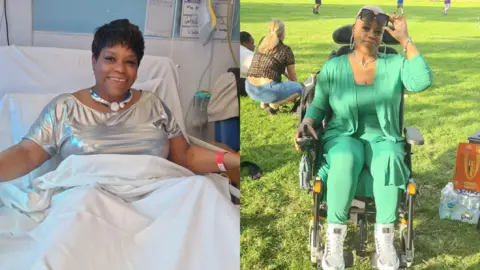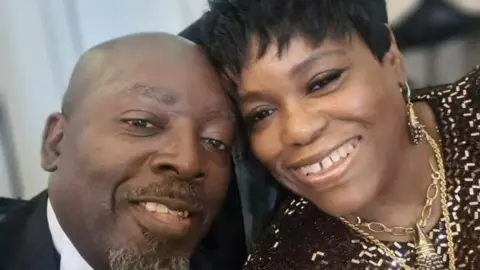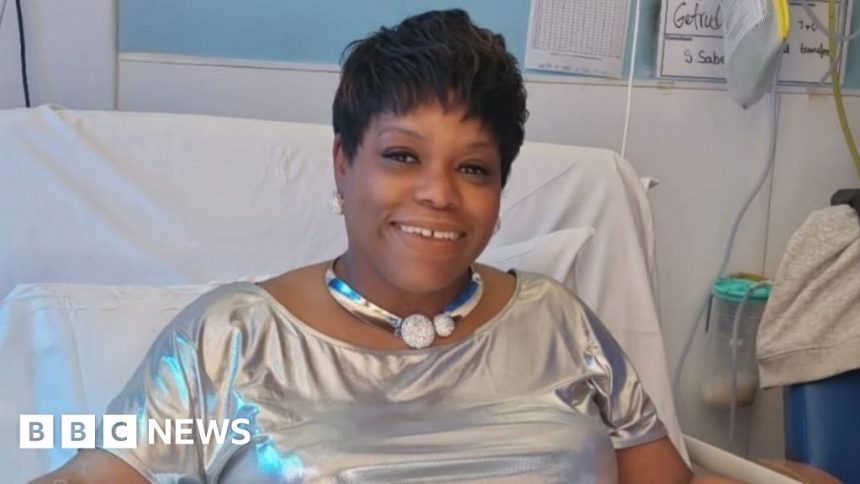‘A stroke left me with an Italian accent’
 Family handout
Family handout“I remember thinking, ‘Who is that talking?'”
On 4 May, Althia Bryden was found in her bed unresponsive and with her face visibly drooping on the right side.
The 58-year-old, from Highbury, north London, was rushed to hospital and found to have had a stroke that had left her unable to speak or feel the upper-right side of her body.
Doctors identified a carotid web in her neck – a rare shelf-like structure that can interrupt blood flow to the brain – as the cause and, in August, they performed surgery to remove it.
The following day while recovering in intensive care, she says a nurse woke her to take her blood pressure and “completely out of the blue, I just started speaking”.
“She looked as shocked as I did. The nurse rushed to get colleagues round to my bed. No-one could believe I was talking after so long,” she explains.
However, the medical staff also noticed something strange about her voice.
“They asked me if I had an Italian accent before my stroke and were telling me I had a strong accent,” she says.
“In the whirlwind of it all, I was so confused.”
 Family handout
Family handoutThe grandmother, who is a medically retired customer service advisor, says she has never spoken Italian or even visited Italy, but has now gained a distinct accent.
She claims she even uses words and mannerisms such as “mamma mia”, “bambino” and “si” in conversation without realising it.
“Before, I didn’t sound like the Queen, but I sounded British. I’ve always lived in London, but all my family are from Jamaica.”
Althia is waiting for a formal diagnosis but says her speech and language therapist has suggested she has foreign accent syndrome.
The rare condition is described by the NHS as being where a person’s speech takes on an accent different from their usual one, which other people can think sounds foreign, and usually happens as a result of brain damage, such as from a stroke.
“Doctors and nurses saw me as a bit of a medical marvel – none of the nurses, doctors, therapists or surgeons had dealt with foreign accent syndrome in their whole careers,” Althia says.
“This is when I realised just how rare this condition is. I wish more people knew about it.”
‘I don’t know who I am’
While she knows she is “lucky to be alive” having suffered a stroke, the 58-year-old feels like she has lost her identity due to her condition and has “no control” over the sounds she makes.
“Even my laugh is not the same… I’m not me. I feel like a clown with an upside-down smile that people are watching perform.
“It’s very sad – everything is different, even my body language is different. People aren’t meeting the original me, I don’t know who I am,” she says.
Each morning Althia says she wakes hoping her accent will be gone but her speech therapist and doctors do not know if her original voice will ever return.
“I’m still looking for the person I was before,” she says.
“Where do I go to find the button to switch this stuff off?”
Since having her stroke, she has received support from the Stroke Association, including home visits from a coordinator and attending support groups, which have helped her.
“It made me realise having foreign accent syndrome is part of my story, and I shouldn’t be ashamed,” Althia says.
However, she has yet to meet anyone else with foreign accent syndrome who has been through the same experience, and says this often makes her feel isolated.
“I want to meet someone with it, and be able to relate to someone and have that connection.”
Listen to the best of BBC Radio London on Sounds and follow BBC London on Facebook, X and Instagram. Send your story ideas to hello.bbclondon@bbc.co.uk





